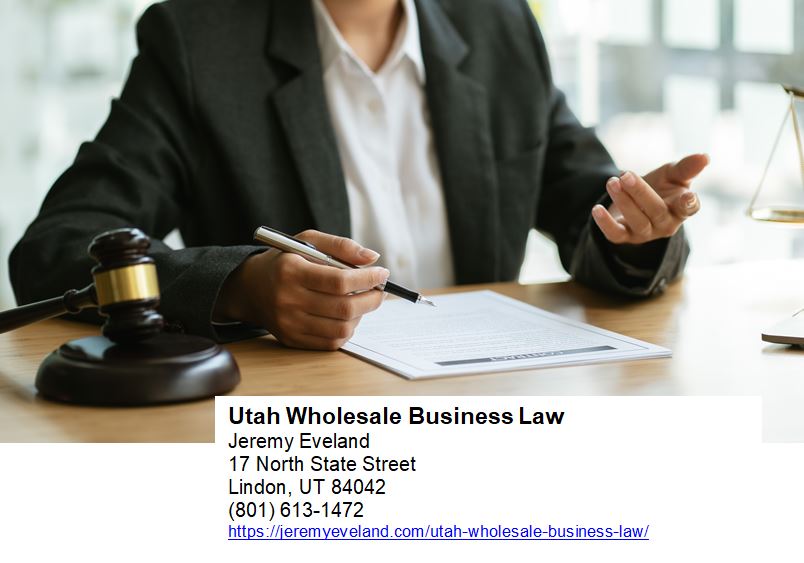Utah’s wholesale laws and regulations are essential knowledge for any business owner or individual looking to engage in wholesale activities within the state. This article serves as a comprehensive guide, providing valuable insights into the legal requirements, restrictions, and best practices governing the wholesale industry in Utah. By understanding the intricacies of these laws, you can ensure compliance and mitigate potential risks associated with wholesale operations. Whether you’re an established business owner or a budding entrepreneur, this article equips you with the necessary information to navigate Utah’s wholesale landscape with confidence.

What is Wholesale?
Wholesale is a business model where goods are sold in large quantities to retailers or other wholesalers, rather than directly to end consumers. It is an essential part of the supply chain that enables the distribution of goods on a larger scale. Wholesale transactions typically involve significant volume discounts, allowing retailers to purchase merchandise at a lower cost and sell it at a profit.
Definition of Wholesale
Wholesale is a term used to describe the sale of goods or merchandise in bulk quantities at a discounted price. The primary objective of wholesale is to facilitate the distribution of products to retailers, who then sell them to the final consumers. Wholesalers act as intermediaries between manufacturers or distributors and the retailers, ensuring a smooth flow of goods from the production stage to the retail market.
Wholesaler vs Retailer
Wholesalers and retailers play distinct roles in the supply chain. Wholesalers, as mentioned earlier, purchase goods in large quantities from manufacturers or distributors and then sell them to retailers. They typically operate on a business-to-business (B2B) model and focus on maintaining relationships with their retail customers.
On the other hand, retailers are the final sellers of goods to the end consumers. They purchase products from wholesalers or directly from manufacturers and offer them to the public in smaller quantities. Retailers operate on a business-to-consumer (B2C) model and are responsible for marketing, displaying, and selling products to individual customers.
Licensing Requirements
Utah has specific licensing requirements for wholesalers to ensure compliance with regulations and protect consumers. It is crucial for wholesalers to obtain the necessary licenses before engaging in wholesale activities.
Wholesale License
Obtaining a wholesale license from the Utah State Tax Commission is a mandatory requirement for wholesalers operating in the state. This license allows wholesalers to legally sell goods in large quantities to retailers and other businesses. To acquire a wholesale license, wholesalers must complete an application, pay the required fees, and provide any additional documents requested by the tax commission.
Reseller Certificate
In addition to the wholesale license, wholesalers often need a reseller certificate, also known as a sales tax exemption certificate. This certificate allows wholesalers to buy goods from manufacturers or distributors without paying sales tax. However, wholesalers must then collect sales tax from their retailers when selling the goods. To obtain a reseller certificate, wholesalers must apply through the Utah State Tax Commission and provide information about their business operations.
Permissible Wholesale Activities
Wholesalers are authorized to engage in specific activities in the wholesale market, ensuring the smooth operation of the business and maintaining fairness among participants.
Selling to Retailers
One of the primary activities of wholesalers is selling goods to retailers. Wholesalers offer a wide range of products in bulk quantities, allowing retailers to purchase inventory at a discounted price. This wholesale model enables retailers to benefit from economies of scale and achieve higher profit margins when selling to end consumers.
Selling to Other Wholesalers
Wholesalers also have the option to sell goods to other wholesalers. In some cases, wholesalers may specialize in specific product categories or serve as intermediaries in the supply chain. Selling to other wholesalers allows for efficient distribution and ensures that goods reach various markets and retailers effectively.
Prohibited Wholesale Activities
While there are permissible activities in wholesale, certain actions are strictly prohibited to protect consumers and maintain fair competition in the market.
Selling to End Consumers
Wholesalers are prohibited from selling goods directly to end consumers. The purpose of wholesale is to distribute goods in bulk to retailers who then sell them to individual customers. This strict division of roles ensures proper customer service, product warranties, and after-sales support.
Price Fixing
Price fixing, which involves collusion between wholesalers to set prices artificially, is strictly prohibited. Wholesalers must compete fairly in the market and avoid engaging in anti-competitive practices. Price fixing can harm consumers by reducing competition, increasing prices, and limiting choices in the retail market.

Consumer Protection Laws
Consumer protection laws are in place to safeguard the rights and interests of consumers. Wholesalers must adhere to these laws to ensure the safety and satisfaction of the end consumers.
Product Labeling
Wholesalers are responsible for ensuring that the products they sell are properly labeled. Product labels provide vital information about the product, such as ingredients, usage instructions, and warnings. Compliance with labeling requirements is crucial to protect consumers from potential health hazards and ensure transparency in product information.
Product Safety
Wholesalers must comply with product safety regulations to prevent the sale of goods that could pose a danger to consumers. Safety standards vary depending on the type of product, and wholesalers must carefully select suppliers and manufacturers that meet these standards. Regular monitoring of product safety is essential to protect consumers and maintain a high level of integrity in the wholesale industry.
Distribution Agreements
Distribution agreements between wholesalers and manufacturers or distributors outline the terms and conditions of the business relationship. These agreements help establish clear expectations and responsibilities for both parties involved.
Contractual Obligations
Distribution agreements specify the obligations of wholesalers, such as the volume of goods to be purchased, marketing and advertising support, payment terms, and delivery schedules. Wholesalers must fulfill their contractual obligations to maintain a strong partnership with manufacturers or distributors and ensure uninterrupted supply.
Territorial Restrictions
In some cases, distribution agreements may include territorial restrictions that limit wholesalers’ operations to a specific geographic area. These restrictions can be beneficial for wholesalers, as they provide exclusivity and prevent competition from other wholesalers within the designated territory. Compliance with territorial restrictions is essential to maintain the integrity of the distribution agreement and avoid legal disputes.
Utah’s Wholesale Taxes
Wholesalers operating in Utah are subject to specific tax requirements imposed by the state. It is essential for wholesalers to understand and comply with these tax obligations to avoid penalties and legal issues.
Sales Tax
Utah imposes a sales tax on retail sales of tangible personal property. Wholesalers are not required to collect sales tax at the time of sale unless they have a retail component to their business. However, wholesalers may need to provide a resale certificate to their suppliers to avoid paying sales tax on the goods purchased for resale.
Use Tax
Wholesalers are responsible for paying use tax on goods they purchase for their own use or consumption rather than for resale. Use tax is imposed at the same rate as sales tax and must be reported and paid to the Utah State Tax Commission. Compliance with use tax obligations is crucial to avoid penalties for non-payment.
Enforcement and Penalties
To ensure compliance with wholesale laws and regulations, enforcement measures are in place, and penalties can be imposed on wholesalers found to be non-compliant.
Compliance Inspections
The Utah State Tax Commission conducts compliance inspections to ensure wholesalers are operating within the legal framework. Inspectors may visit wholesale establishments to verify licensing, record-keeping, and tax compliance. Wholesalers should maintain accurate records, including sales invoices, purchase records, and financial documentation, to facilitate smooth inspections.
Consequences of Non-Compliance
Non-compliance with wholesale laws and regulations can result in severe consequences for wholesalers. Penalties may include fines, suspension or revocation of licenses, and legal action. Wholesalers risk reputational damage and loss of business if they are found to be non-compliant. It is crucial for wholesalers to maintain a strong compliance program to avoid these consequences.

Wholesale in Specific Industries
Certain industries have unique regulations and considerations when it comes to wholesale activities. Utah has specific regulations for two notable industries: alcohol and beverage wholesale and pharmaceutical wholesale.
Alcohol and Beverage Wholesale
The wholesale distribution of alcoholic beverages is heavily regulated to ensure public safety and prevent the sale of alcohol to minors or individuals who are prohibited from consuming it. Wholesalers in this industry must obtain additional licenses and comply with specific requirements set by the Utah Department of Alcoholic Beverage Control.
Pharmaceutical Wholesale
Pharmaceutical wholesalers play a critical role in ensuring the availability of prescription drugs and other healthcare products. These wholesalers must comply with strict regulations, including licensing requirements, record-keeping, and safety standards established by regulatory bodies such as the Utah Department of Health and the U.S. Food and Drug Administration.
Resources for Utah Wholesalers
Utah wholesalers can access various resources to stay informed and ensure compliance with laws and regulations.
Utah State Tax Commission
The Utah State Tax Commission provides comprehensive information on wholesale licenses, resale certificates, and tax obligations. Wholesalers can access the commission’s website or reach out to their representatives for guidance and assistance.
Utah Department of Commerce
The Utah Department of Commerce offers resources and guidance for wholesale businesses operating in the state. Wholesalers can access the department’s website for information on licensing, compliance, and other relevant topics.
In conclusion, understanding wholesale laws and regulations is essential for Utah wholesalers to operate legally and efficiently. Complying with licensing requirements, engaging in permissible activities, adhering to consumer protection laws, and fulfilling contractual obligations are all crucial aspects of running a successful wholesale business. Wholesalers must also be aware of tax obligations, enforcement measures, and industry-specific regulations to avoid penalties and maintain a strong reputation in the market.
Frequently Asked Questions (FAQs)
-
Do all wholesalers in Utah need a wholesale license?
- Yes, all wholesalers operating in Utah are required to obtain a wholesale license from the Utah State Tax Commission.
-
What is the purpose of a reseller certificate?
- A reseller certificate, also known as a sales tax exemption certificate, allows wholesalers to buy goods without paying sales tax when the goods are intended for resale.
-
Can wholesalers sell directly to end consumers in Utah?
- No, wholesalers are prohibited from selling goods directly to end consumers. Their primary customers are retailers, who then sell the goods to the final consumers.
-
What are the potential penalties for non-compliance with wholesale laws?
- Non-compliance with wholesale laws in Utah can result in penalties such as fines, suspension or revocation of licenses, and legal action.
-
Are there specific regulations for the wholesale distribution of alcohol and pharmaceuticals in Utah?
- Yes, the wholesale distribution of alcohol and pharmaceuticals in Utah is subject to additional regulations and licensing requirements set by relevant regulatory bodies.







